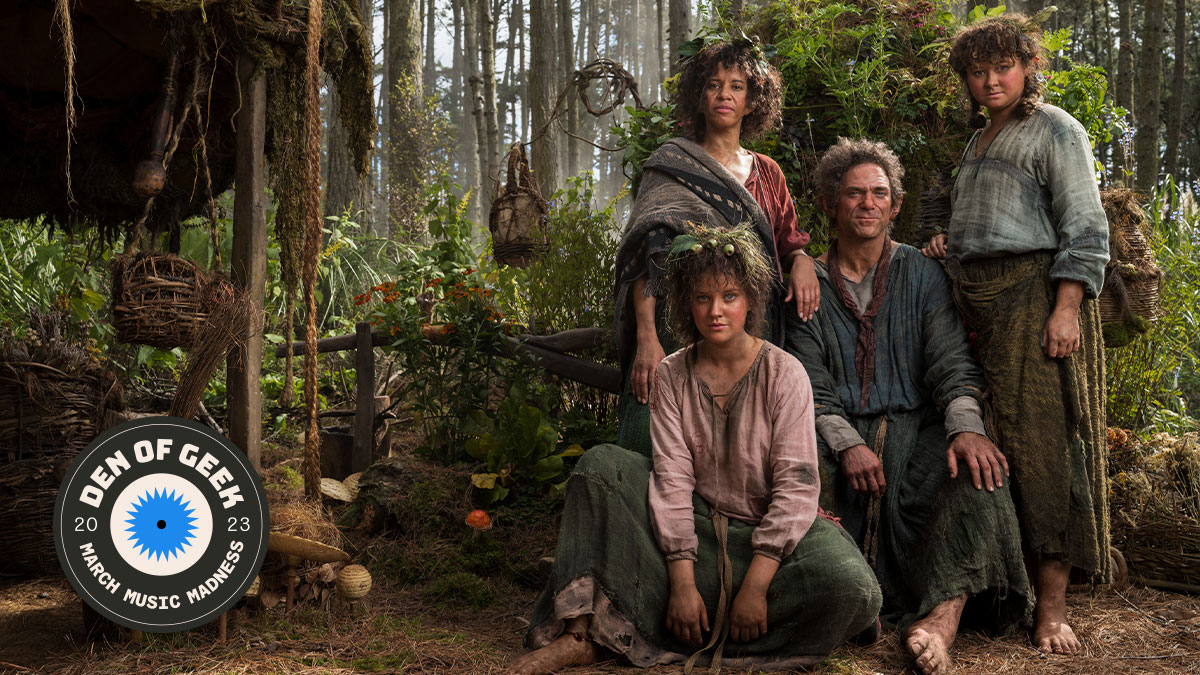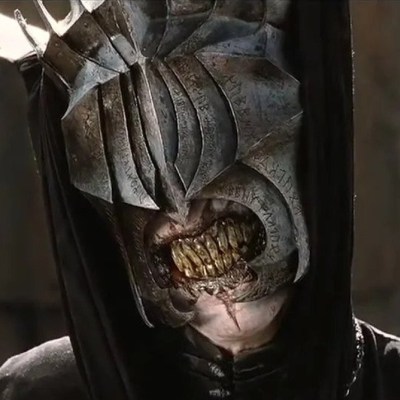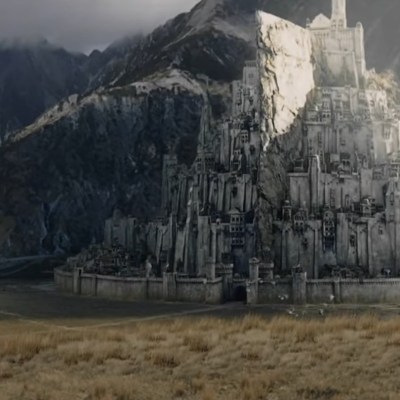Music has always played an important role in Tolkien adaptations. J.A. Bayona, producer and director on Amazon’s Lord of the Rings: The Rings of Power, told Den of Geek last year that he played music on set for the actors to help them get “the right tone” for their characters, and that “there’s an… obvious sense of musicality when you read the books” which is “all about language and the beauty of language.” The show’s season one finale even featured a new musical setting for Tolkien’s “Rhyme of the Rings,” written by Bear McCreary and performed by Fiona Apple, which was generally well-received by fans.
Anyone who has read The Hobbit or The Lord of the Rings knows that the books are full of songs. Aragorn sings old Elvish ballads, Bilbo is quite the composer, the Dwarves have songs about their ancient mines, the Rohirrim love melancholic battle epics, and even goblins have a tendency to burst into a musical number at any moment. Every dramatic adaptation has to decide how it’s going to deal with this particular aspect of J.R.R. Tolkien‘s writing – whether to include any of them, which ones to include, and how to perform them.
There are several stage musical adaptations of The Hobbit and The Lord of the Rings, the best known of which is probably the version which premiered in Toronto in 2006 and had a one year run in the West End in 2007-2008. The composers were A. R. Rahman, Värttinä, and Christopher Nightingale, with lyrics by Shaun McKenna and Matthew Warchus. There are not enough of Tolkien’s songs in The Lord of the Rings to make an entire stage musical, so most of the songs are original, but the show does incorporate several of Tolkien’s songs, as well as original lyrics written in the Elvish language Quenya.
The closest number in tone and feel to the way the song is described in the book is “The Cat and the Moon,” based on “The Man in the Moon Stayed Up Too Late.” This is inspired by the nursery rhyme “Hey Diddle Diddle” (Tolkien’s narration notes that “only a few words of it are now… remembered”). In the story, Bilbo wrote this “full” version, and Frodo gets up on a table and sings it in The Prancing Pony, trying to distract everyone from the fact Pippin is about to give away who they are. In the musical, this starts out as a fun nursery-rhyme type song, just as the book version does, though of course on stage it soon turns into a rollicking chorus number.
The other songs directly inspired by Tolkien’s work keep a lot of the lyrics, but are re-styled to fit into the conventions of modern musical theatre. So although “The Road Goes On” is suitably upbeat and “Lament for Moria” mournful, both feel like fairly typical stage musical numbers that just happen to have Tolkien’s lyrics attached to them. That’s a sensible decision for the medium, but it makes them feel less like the songs as described in the books.
Ralph Bakshi’s 1978 animated The Lord of the Rings (which was supposed to be Part 1 of 2 and stops abruptly at the conclusion of the Battle of Helm’s Deep) includes very few Tolkien songs at all. The only major song to appear in it (bits and pieces of humming or Orc chanting aside) is “The Man in the Moon.” This pretty accurately reflects Tolkien’s description, with a bright and simple tune that everyone in the pub can clap along to. But in general, Bakshi was not interested in including Tolkien’s music in his adaptation, and Bilbo speaks poems rather than singing in Rivendell. Bakshi apparently “growled” to The New York Times in 1977 that the film “is not going to have any song for the sake of a record album,” seemingly a dig at the much more musical animated film of The Hobbit directed by Arthur Rankin Jr. and Jules Bass and made for television that same year.
For a long time, many book fans’ favorite adaptation of The Lord of the Rings was the 1981 26-episode BBC Radio 4 dramatization, written by Brian Sibley and Michael Bakewell, with music by Stephen Oliver. This version includes several of Tolkien’s songs set to music, some of which feel closer to what is described in the books than others. “O! Elbereth Gilthoniel” sounds almost early modern (the period roughly between 1500 and 1800) in its influence, as if the Elves are English Tudor Kings and Queens. Some of the hobbits’ walking songs are a little bit plodding and mournful, but some are done very effectively. Bill Nighy as Sam singing a simple song without accompaniment to keep himself going in an Orc watchtower in Mordor is hauntingly beautiful.
The most effective use of one of Tolkien’s songs in the radio version is the “Ballad of the Mounds of Mundbrg.” Faced with the challenge of how to dramatize a battle scene on the radio, the writers made use of one of Tolkien’s songs from the book, which he said was written by a Rohirrim singer after the battle and which describes the deaths of several Rohirrim warriors, including Théoden. The song, which is composed to sound like a poetic ballad, with a rhythmic, chanting tone, was interspersed with battle sound effects and dialogue from the characters, so that the audience can follow what’s happening in the battle, as well as giving the scene a richer feel than having people just listen to sword-clashing sound effects for several minutes. It’s a really clever idea, and it’s also a very book-accurate adaptation of Tolkien’s song.
Read more
The Peter Jackson Lord of the Rings trilogy did not include very many of Tolkien’s songs, and all three of the songs that closed out the films were original compositions. But it did include a few of them, as well as some recited as poems rather than being set to music, like Théoden’s (Bernard Hill) recitation of the song “chanted” by Aragorn in the book, “Where now the horse and the rider?”
The songs that are the closest to their book counterparts are the hobbits’ songs – Merry and Pippin’s drinking song, Bilbo’s “The Road Goes Ever On,” and Pippin’s “The Edge of Night.” The lyrics to “The Edge of Night” come from a hobbit walking song that appears early in the book. However, the song is transposed to a much later scene, in Minas Tirith on the brink of war. The tune, performed by Billy Boyd as Pippin, is more mournful and elegiac than the setting of Tolkien’s original suggests, and the more comedic or homely parts of the song, like the last lines “And then to bed! And then to bed!” have been left out. Merry and Pippin’s song has been moved and is sung by Merry with Pippin, rather than Sam, but is otherwise very close to Tolkien’s tone for the song in the book. “The Road Goes Ever On” feels even more like the book’s description of the song Bilbo sings “softly” to himself as he walks away from Gandalf after his disappearance at his birthday party.
The Extended Edition of The Fellowship of the Ring also includes one of Tolkien’s songs that is presented fairly closely to the book version. Aragorn (Viggo Mortensen) sings softly to himself in Elvish a quiet, unaccompanied song about Beren and Lúthien. The gentle tune fits with Tolkien’s description of chanting an ancient lay.
Notably, The Lord of the Rings movies left out “The Man in the Moon,” but the song was later included in Peter Jackson’s The Hobbit trilogy. The live-action films actually boast many of the most book-accurate depictions of Tolkien’s songs. “Blunt the Knives,” a.k.a. the “Dwarves doing dishes song,” is rousing and fun, and the musical setting for “Far Over the Misty Mountains Cold” (listed as “Misty Mountains”) is achingly beautiful. Performed unaccompanied even though Tolkien’s Dwarves played instruments, it starts with Thorin’s (Richard Armitage) deep bass rolling over the scene, evoking the deep mountain mines that the song is about. Instruments aside, both songs could have been lifted straight from the pages of the book.
But there was a reason that Jackson didn’t adapt “The Man in the Moon” in his first trilogy, and that one of Tolkien’s songs (as well as a couple of original songs, like the “Lament for Gandalf” and Éowyn’s Old English lament for Théodred) got bumped to the Extended Editions. There is only so much running time available in a movie.
When it came to The Hobbit trilogy, rather than adapting three large adult books into three movies, Jackson was adapting one medium-sized children’s book into three movies, and was therefore actively looking for padding, rather than trying to avoid it. Although not every single song from the book is included, as there are a lot of them, the film even adds an extra song for the goblins. Tolkien’s goblins sing (“or croak”) a fairly short song about taking their prisoners down to “Goblin-town,” which Tolkien describes as “truly terrifying.” The film includes this song, but with the huge flapping chin design for the Great Goblin and the length of the song, it comes across as more strange and ridiculous than terrifying. The film adaptation then adds a section all about the various ways the goblins plan to torture the Dwarves, which is just deeply unpleasant – but still not actually very scary.
The plot simply stops for the songs in Jackson’s second trilogy. In Tolkien’s books, this isn’t too much of an issue. Reading a book is a longer and slower activity than watching a movie, and readers are investing more time in immersing themselves in the book’s world. They can also easily skip a song if they want to. None of that is true of a feature film. A really effective adaptation, then, will not only produce music and settings for the songs that suit their tone, but will use them in effective ways, and cut them if they aren’t helping to advance the story. We’ve already seen this in the radio adaptation, which used the Rohirrim’s ballad to tell the story of the battle. But this is done most effectively in the 1977 Rankin/Bass animated film of The Hobbit, which incorporates the songs almost perfectly.
The Rankin/Bass version essentially takes Tolkien’s songs and uses them to make a musical adaptation composed by Maury Laws (of Rudolph the Red-Nosed Reindeer fame), adding a version of “The Road Goes Ever On” from The Lord of the Rings as well. There is only one original song, “The Greatest Adventure,” written because Rankin felt Bilbo was lacking a motivation song, as he told The New York Times at the time. This works, not only because The Hobbit has a higher proportion of songs in it than The Lord of the Rings anyway, but also because the film is a children’s animation. Disney had been making children’s animated films as musicals since Snow White and the Seven Dwarfs, so using the songs that are in the book to tell the story makes sense.
One of the highlights is “Far Over the Misty Mountains Cold,” which is not only nearly as good as Howard Shore’s version, but the sequence is also used to provide a flashback to the destruction of Dale by Smaug, which is described in the lyrics. This means that the story doesn’t have to stop for the Dwarves to sit around and sing a song – the song becomes part of the story. The dishes-washing song, meanwhile, is changed to a dream of Bilbo’s while trying to sleep in the Misty Mountains, and appears only very briefly.
The biggest down side to this approach is that many of the songs are quite short. Whereas the live-action Hobbit films are several hours too long, this film, at only one hour and 17 minutes, actually feels a bit rushed. It even leaves out Bilbo’s song taunting the giant spiders in Mirkwood as he runs around them, invisible, presumably in order to make the sequence scarier and more action-oriented. The least successful song is probably “Fifteen Birds in Five Fir Trees,” which the goblins sing when they have the group cornered, and which just sounds rather strange and has a substantial musical accompaniment that the goblins couldn’t possibly have brought with them while riding their Wargs. And the Elves’ song as our heroes walk down into Rivendell is perhaps a little bit too Disney-like for Tolkien, even for a lighter version like this, in which Elrond has an inexplicable halo of stars around his head.
The Rankin/Bass sequel to The Hobbit, The Return of the King (1980), which was also composed by Maury Laws, opens with one of the few songs that Tolkien mentioned but didn’t write out in full: a ballad about “Frodo of the Nine Fingers and the Ring of Doom,” sung by a “minstrel of Gondor.” This is used as a framing device to take us into an extremely abbreviated version of The Lord of the Rings. The film is not a sequel to Bakshi’s version and has no official connection to it, but it still picks up exactly where the first animated movie left off, immediately after the Battle of Helm’s Deep, clearly taking advantage of the existence of Bakshi’s film to fill in the gap. The original song inspired by the ballad Tolkien mentioned plays in snatches throughout the film, providing narration and structure as well as commentary and story recap. Other original songs inspired by lines of narrative are included as well, like the Orcs’ marching song “Where there’s a whip, there’s a way,” but no complete adaptations of Tolkien’s songs except for the closing reprise of “Roads Go Ever On” from The Hobbit, with altered lyrics.
In other words, The Rings of Power has a lot to live up to musically – there are some fantastic renditions of Tolkien’s songs out there. Fiona Apple’s performance of “Where the Shadows Lie,” as well as being very creepy and eerie, certainly sounds like it could possibly come from some mysterious Middle-earth source, maybe an Elven warning about the Rings of Power. So far this is the only direct adaptation of one of Tolkien’s songs in the series, although “This Wandering Day,” sung by Megan Richards as Harfoot Poppy Proudfellow, includes the lyric “Not all who wonder or wander are lost,” which echoes the poem Bilbo wrote for Aragorn in The Lord of the Rings: “All that is gold does not glitter / Not all those who wander are lost.” It’s likely that the upcoming season 2 will feature more songs inspired by Tolkien, so let’s hope McCreary keeps up his so far high standard.


